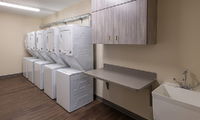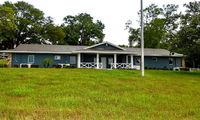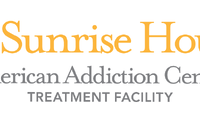Addiction Treatment for Senior Citizens

About one in three older alcoholics (age 45 or older) start to drink heavily later in life. While stress-related drinking is occurs among younger and older adults, these "late onset" drinkers are often faced with situations unique to their age group, such as death of a spouse or close friends. It could also be triggered by a chronic condition that causes pain, or loss of mobility. Even a potentially positive life change like retirement can bring on a sense of uncertainty, causing someone to seek comfort in unhealthy ways.
Whatever the reasons for starting, senior citizens suffering from alcoholism have to face the consequences of their choices. On a positive note, statistics show that many older substance abusers are willing to take part in a treatment program. This is the first step toward successful recovery.
Seniors-Only Rehab Centers
Older adult substance abuse is often seen as a "hidden epidemic," because getting exact numbers on this issue difficult. Some seniors with addiction are misdiagnosed because their symptoms can look similar to other conditions, or be dismissed as being age-related. Unfortunately, certain health professionals stigmatize older addicts, believing it isn't worth the time or money to treat them at their age.
The National Council on Alcoholism and Drug Dependence reports that about 2.5 million adults over age 65 have an alcohol or drug addiction problem. Up to 11 percent of elderly hospital admissions are from alcohol and prescription drug problems.
Senior-only centers offer patients several benefits not found in other locations. Being able to discuss sensitive issues with their peers and to feel better understood provides a greater level of comfort. Caring and non-confrontational support from staff and peers help them navigate the challenges facing them at this stage of their lives.
These centers are better equipped to handle the special needs of seniors in rehab. Drug or alcohol addiction puts a strain on the body, but many older people have the added burden of pre-existing medical conditions. The doctors and nurses at these facilities are equipped to treat multiple problems, while avoiding the dangers of possible drug interactions or too much stress.
Some seniors need more time or extra help to process information. Others may be hard of hearing. Some may need to be told or taught directions multiple times due to memory issues. Seniors-only rehab centers make a greater effort to provide clear communications between staff, patients and families while showing patience and respect during interactions.
Rehab for Alcohol Addiction
With late onset alcoholism, alcohol can exacerbate existing conditions like hypertension, bone density loss, diabetes and heart disease. Depression or other mental illness is aggravated as well.
Alcohol impairs judgment and reaction time, increasing the chances of accidents and injuries. An older adult could be vulnerable to greater damage if they are frail, or simply can't get help right away.
Seniors who enter an alcohol rehab center are evaluated first. The staff documents their physical, mental and emotional conditions, and gathers available medical history on them. Doctors then use this information to craft plans tailored to each individual staying at the center. These plans form the basis of case management services later after discharge.
The next step is detox, which rids the body of any remaining alcohol. This phase requires close, 24-hour supervision by a team trained in geriatric medicine. It's vital that the staff refer to a patient’s medication list because some drugs have dangerous and even fatal interactions with alcohol. Common over-the-counter medicines like aspirin and ibuprofen can damage organs over time, and alcohol tremendously increases that risk. Once a patient is ready, they can begin the rehabilitation stage, which usually lasts four to six weeks.
All activities are meant to equip patients to live sober. Most facilities host a 12-step program (such as AA) as an integral part of patient programs. Lectures on topics regarding the signs of and impact of alcoholism help seniors better understand their disease. One-on-one therapy brings specific issues to light. Daily exercise builds strength in both body and mind.
Drug Rehabs
The majority of drug problems in older adults involve prescription medications. Many began taking prescription medicine per their doctors’ instruction to handle pain from an injury or illness. But an opiate such as Oxycontin or an anti-anxiety med like Valium can become habit-forming. Without intervention, some people end up becoming dependent or addicted.
As with alcohol, drug rehabilitation begins with detox to cleanse the body. This process can cause various side effects, so medical supervision is necessary to ensure patient safety. Withdrawal can also bring on strong cravings, so doctors sometimes use targeted drugs to help reduce symptoms and prevent relapse.
Therapy, whether individual, group or family, is one of the most effective tools used during treatment. Seniors find a safe place to share personal challenges and difficult experiences connected to their drug use. As they learn from each other, they adopt healthier habits and skills they need for a drug-free life going forward.
Inpatient vs. Outpatient Therapy
Seniors and their families must decide if inpatient or outpatient rehab programs is the best option—they both have pros and cons. During an inpatient program (also known as residential program), a person remains at a center 24 hours a day for the length of the treatment program, which is anywhere between 28 and 90 days. Each senior is assigned a room, usually shared with another patient, and attends all meetings and activities held each day. This approach provides a more protected environment with professional supervision, but it has a higher cost, and some patients prefer the comfort of their own homes.
With outpatient rehab programs, seniors attend meetings, therapy and activities at the center, but return to their home afterwards. This approach offers people the comfort of familiar rooms and faces, while also giving them a measure of independence. Reliable transportation and arranging for supervision of the patient while at home, however, can prove challenging.
How to Choose a Senior Rehab Center
Finding the right senior rehab center may seem complicated or even confusing. But there are some general guidelines that can help narrow the search.
- Trained, geriatrically-oriented staff. First, the best senior rehab centers are staffed by professionals who specialize in geriatrics. Mental health, nutrition, and fitness are just some of the areas where the elderly have particular needs and limitations. Doctors and other staff must be able to recognize and deal with the issues of this age group in a positive, inspiring way.
- Case management services. A quality center provides a clear and effective treatment program and case management services as well. Recovery is a lifelong process, and every patient needs to be connected with the right medical, social and psychiatric services after heading home. It's also important to help seniors build a social network to keep them from feeling isolated and lonely.
- Flexible financial programs. Some seniors don't get the treatment they need because of costs. But money is available - a good center will work with potential patients to help them find it. Some insurance companies now offer at least partial coverage for treatment. Medicare is an option for many older patients. Assorted grants and loans are also available through specific centers, and through state or even federal government agencies.
Everyone battling an addiction deserves a chance at recovery, no matter their age. Seniors-only rehab centers offer older adults hope for a cleaner, happier life going forward.
About one in three older alcoholics (age 45 or older) start to drink heavily later in life. While stress-related drinking is occurs among younger and older adults, these "late onset" drinkers are often faced with situations unique to their age group, such as death of a spouse or close friends. It could also be triggered by a chronic condition that causes pain, or loss of mobility. Even a potentially positive life change like retirement can bring on a sense of uncertainty, causing someone to seek comfort in unhealthy ways.
Whatever the reasons for starting, senior citizens suffering from alcoholism have to face the consequences of their choices. On a positive note, statistics show that many older substance abusers are willing to take part in a treatment program. This is the first step toward successful recovery.
Everyone battling an addiction deserves a chance at recovery, no matter their age. Seniors-only rehab centers offer older adults hope for a cleaner, happier life going forward.









